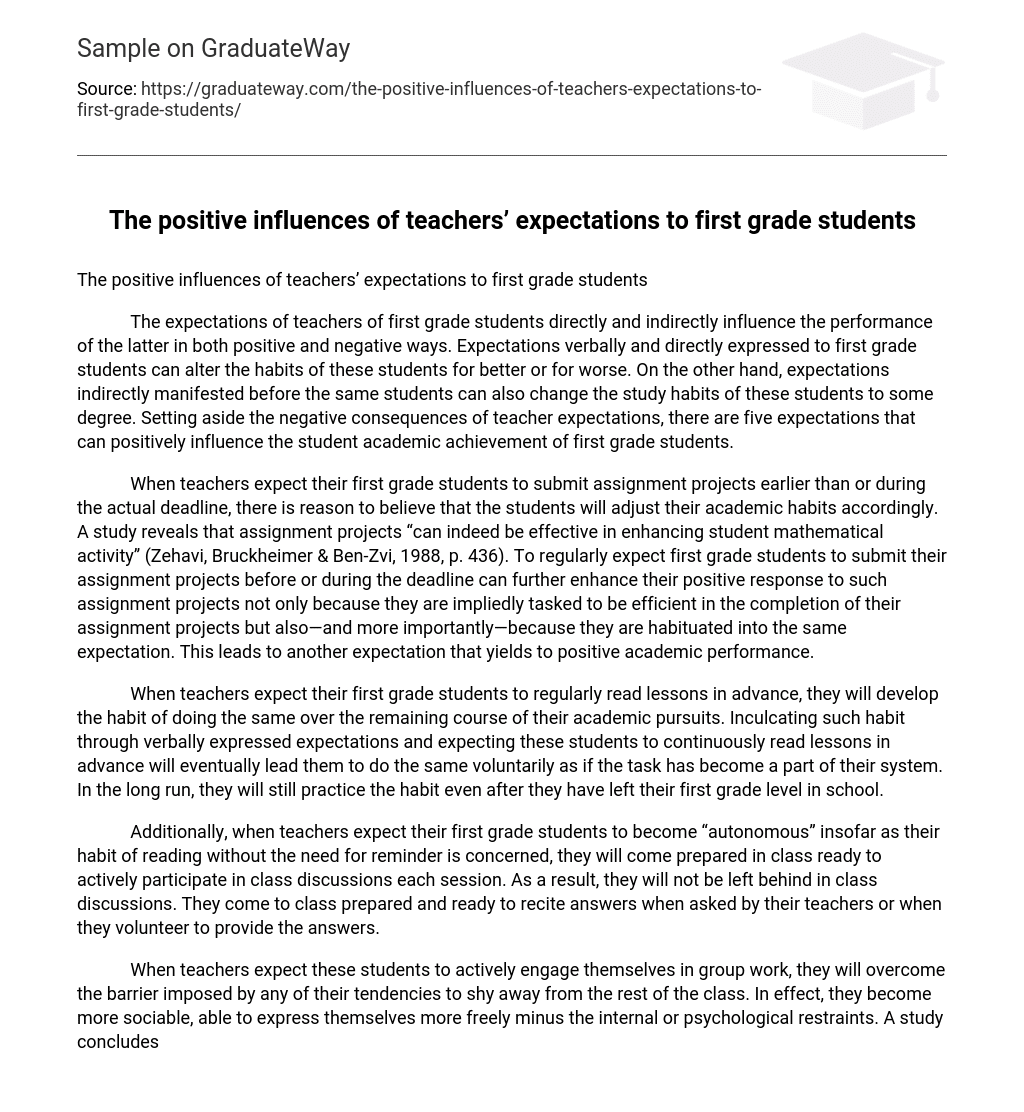The expectations of teachers of first grade students directly and indirectly influence the performance of the latter in both positive and negative ways. Expectations verbally and directly expressed to first grade students can alter the habits of these students for better or for worse. On the other hand, expectations indirectly manifested before the same students can also change the study habits of these students to some degree. Setting aside the negative consequences of teacher expectations, there are five expectations that can positively influence the student academic achievement of first grade students.
When teachers expect their first grade students to submit assignment projects earlier than or during the actual deadline, there is reason to believe that the students will adjust their academic habits accordingly. A study reveals that assignment projects “can indeed be effective in enhancing student mathematical activity” (Zehavi, Bruckheimer & Ben-Zvi, 1988, p. 436). To regularly expect first grade students to submit their assignment projects before or during the deadline can further enhance their positive response to such assignment projects not only because they are impliedly tasked to be efficient in the completion of their assignment projects but also—and more importantly—because they are habituated into the same expectation. This leads to another expectation that yields to positive academic performance.
When teachers expect their first grade students to regularly read lessons in advance, they will develop the habit of doing the same over the remaining course of their academic pursuits. Inculcating such habit through verbally expressed expectations and expecting these students to continuously read lessons in advance will eventually lead them to do the same voluntarily as if the task has become a part of their system. In the long run, they will still practice the habit even after they have left their first grade level in school.
Additionally, when teachers expect their first grade students to become “autonomous” insofar as their habit of reading without the need for reminder is concerned, they will come prepared in class ready to actively participate in class discussions each session. As a result, they will not be left behind in class discussions. They come to class prepared and ready to recite answers when asked by their teachers or when they volunteer to provide the answers.
When teachers expect these students to actively engage themselves in group work, they will overcome the barrier imposed by any of their tendencies to shy away from the rest of the class. In effect, they become more sociable, able to express themselves more freely minus the internal or psychological restraints. A study concludes that sociable children are able to manifest greater interpersonal negotiation strategies “when resolving hypothetical conflicts” (Adalbjarnardottir, 1995, p. 1739). Since part of classroom activities for first graders involves the resolution of hypothetical conflicts, it is to the great benefit of these students to be expected to participate in group work to the fullest extent possible.
Finally, when teachers expect these students to discuss at home pertinent school matters with their parents, these students will develop deeper personal bonds with their parents or legal guardians. As a consequence, such bonds will promote the study habits of these students under the guidance of their parents or legal guardians. In fact, a research indicates that parental involvement in the school affairs of children positively reinforces the learning habits of young students (Carreón, Drake & Barton, 2005).
It is important to note that first graders are chosen as the subject of teacher expectations because it is the point where students have already passed the initial stages of learning—either preschool or parental teaching at home—and are now on the stage where they are gradually introduced to a higher level of learning. All of the expectations presented, when directly expressed by teachers to their first grade students, can help aid students achieve better academic performance in both short and long terms.
References
Adalbjarnardottir, S. (1995). How Schoolchildren Propose to Negotiate: The Role of Social Withdrawal, Social Anxiety, and Locus of Control. Child Development, 66(6), 1739-1751.
Carreón, G. P., Drake, C., & Barton, A. C. (2005). The Importance of Presence: Immigrant Parents’ School Engagement Experiences. American Educational Research Journal, 42(3), 465-498.
Zehavi, N., Bruckheimer, M., & Ben-Zvi, R. (1988). Effect of Assignment Projects on Students’ Mathematical Activity. Journal for Research in Mathematics Education, 19(5), 421-438.





